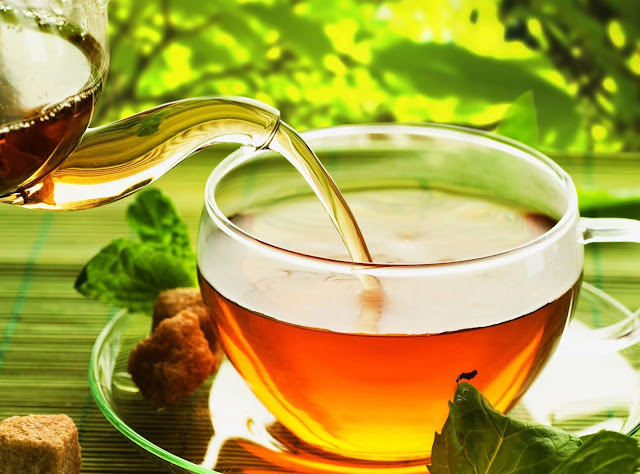
Tea is a beverage of ever greater
popularity. Not only because of the enjoyment by the fragrance and
aroma to do something good yourself with a cup of tea. Our health
benefits from the positive properties of the tea leaves. This is
confirmed by numerous scientific studies, in which the effects of
various substances in tea on our body were explored. In addition to
the primary odour and taste-the flavouring substances such as
essential oils and Theanine, some special ingredients in tea are
included, even the prevention of various diseases is said to have.
Particularly noteworthy here are the polyphenols. Other important
ingredients in tea are fluoride which strengthens the enamel and
prevents caries, and manganese, which is involved in the formation of
bone substance
Polyphenols - protection against
radicals
The polyphenols are secondary plant
substances. They have a strong antioxidant effect, i.e. they can
intercept free radicals that cause oxidation to cell damage in our
organism. Because of the high antioxidant potential, a protective
effect with regard to many degenerative diseases such as cancer and
heart disease attributed to polyphenols.
Info "free radicals": In
human body, oxygen radicals caused by smoking, strong ultraviolet
radiation, but also by ordinary metabolic processes to a greater
extent. These cause the so-called 'oxidative stress' in the body,
leading proteins and enzymes to damage of many cellular structures
such as cell membranes, and can trigger even changes to the genetic
material. "Antioxidants", which protect the body from
unwanted oxidative damage already at very low concentrations are used
to fend off the radicals. These include the polyphenols from tea.
More examples are vitamin E, C, selenium & beta carotene.
The Effects Of Tea...
On the cardio vascular system
The oxidation of the so-called "bad"
LDL cholesterol by free radicals plays an important role in the
development of cardiovascular disease. This significantly increases
the risk for hardening of the arteries and heart attacks. Scientific
studies could show that tea drinkers have a lower risk of
cardiovascular disease. Probably responsible for among other things
the effect of tea-polyphenols as a free radical scavenger.
On the carcinogenesis
In recent years, many studies have
dealt with the effect of the tea ingredients on the development of
cancer. The results show that regular tea consumption may have a
preventive effect on cancer. So, for example, a Japanese study of
over 8500 people took part, showed that the risk of cancer is
plummeting with a consumption of more than 10 cups of tea per day.
One explanation for this is that the polyphenols in the tea Act on
the rate of cell duplication and influence therefore the growth and
the development of cancers.
On the skin
Also the skin benefits of tea drinking.
The antioxidant effective Polypenole serve as a protection against
radicals, caused by UV radiation. You can counteract so Sun-induced
skin damage, protect against premature aging of the skin and prevent
possibly even skin cancer. Current research also deals with the
effect of tea on inflammatory skin diseases such as psoriasis. So
far, there are only results from animal studies. These are but very
promising.
On infectious diseases
We are constantly surrounded by viruses
and bacteria that keeps the immune system of our body generally good
at chess. But we are not always immune prior to the outbreak of
infectious diseases, for example caused by salmonella and influenza.
Tea drinkers seem to be less vulnerable. The catechins in tea
probably inhibit the growth of harmful bacteria and viruses.
Info: What is better - black or green
tea? Because of the different way of processing different types of
polyphenols found in green and black tea. The catechins (such as
Epigallocatechin gallate - EGCG) is dominated by green tea, black tea
contains, however, mainly during the fermentation of the catechins of
resulting Theaflavins and Thearubigene. Antioxidant have potential
both polyphenols from green and black tea. The time of brewing up has
additional influence on the antioxidant activity. The longer pulls
the tea, the higher is the content of polyphenols.
No comments:
Post a Comment